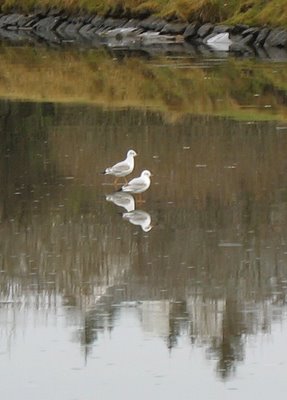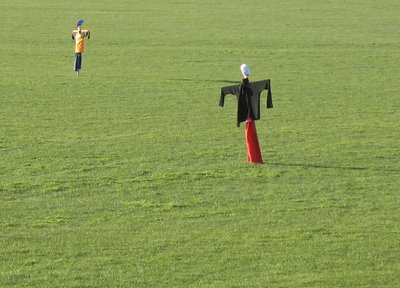
Tuesday, October 31, 2006
A Mural

The horse at the top of the picture, whom we only see the half of, is Óðinn's horse Sleipnir, the finest of all horses. You can identify Sleipnir easily because he has eight legs. He is the son of Svadilfari, a grey stallion belonging to a frost giant, and Loki the god of trickery, who turned into a white mare in order to entice Svadilfari away from his owner. As you might be able to guess, there's a story behind this, but I'll leave it till later. Anyhow, Sleipnir is sometimes depicted with six legs, four at the back and two at the front, but here he has all eight, so you can distinguish him from a beetle. But mistake him for a spider, perhaps.
Reflections



These all seem to be on a similar theme. I wanted the one with the child in it to look as if it was a child on display in a shop window, but the little fool moved at inopportune moments. Can't they just glue his feet to the floor or something?
Labels:
faces
Those Ker-azy Serbs

There was an exhibition of Serbian photography in the photo museum, as well as one of Polish photos from the era of Solidarity. The Serbs looked like they had more fun. Or else were better able to cope with being humiliated by the photographer.
Monday, October 30, 2006
Look at the sonnets
'Did you ever think that Shakespeare had a cat? Look at the sonnets. Most of them aren't written to a woman or a boy. They're addressed to a cat.'
Kenneth Tynan reports a conversation with Gordon Craig, 1956.
Kenneth Tynan reports a conversation with Gordon Craig, 1956.
Friday, October 27, 2006
Yes, but is it art?
Reykjavík is having a few weeks of exciting contemporary artists setting up mobile exhibitions in strange places all over the city. The exhibition I went to yesterday was mostly concerned with the slightly naïve appropriation of political imagery in order to show videos of an imaginary parallel universe in which Reykjavík was conquered by a band of guerilla fighters, who poisoned the water supply, executed all the children, and masturbated into a gigantic cockroach. I didn't quite follow the last bit. They also hung flags adorned with a diagrammatic representation of a womb all over the main shopping street. Today's exhibition, which involved dry ice, video footage of gypsy fiddlers, and this disturbing doll-face stuffed into a large false intestine,

was a little less offensive but no more comprehensible. I suppose this post should really be signed 'Disgusted of Tunbridge Wells' - why can't we have proper art like in the good old days? You know, oil on canvas, absinthe and people chopping their ears off?

was a little less offensive but no more comprehensible. I suppose this post should really be signed 'Disgusted of Tunbridge Wells' - why can't we have proper art like in the good old days? You know, oil on canvas, absinthe and people chopping their ears off?
Labels:
faces
Icelandic Faces 5


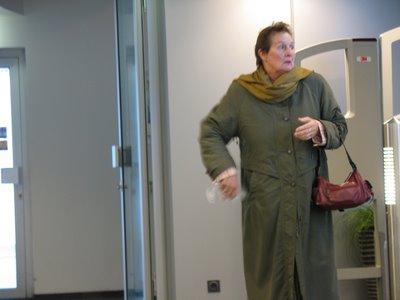
These were all taken in the lobby of Reykjavik's main library, which is also where they hide the photo museum.
Labels:
faces
Icelandic Lesson
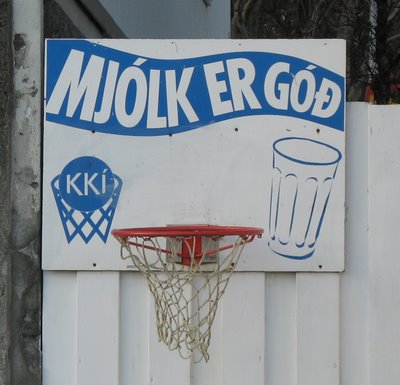
Here is a piece of seventies propaganda from the pro-calcium lobby. I don't need to translate, do I?
Labels:
languages
Vega conspicuous overhead

This is a photo of the blue star Vega taken by my brother without a tripod. I feel like interpreting it as writing of some sort.
Labels:
lights
Thursday, October 26, 2006
Jacques Réda
La Porte
Et pourtant c'est ainsi: l'on voit, par la porte battante,
Une lumière qui s'approche, hésite puis s'éteint.
Souvent l'attente se prolonge. Et seul, à qui sourire
En silence? Personne. Et qui nous répondrait de loin
Si l'on criait? Personne encore. Un jour on croit rêver,
Un autre jour mourir - et vraiment c'est un songe, et c'est
Aussi la mort. Passent parfois deux lévriers timides
Et plutôt soucieux qui font mine d'en savoir long
Sur le sens de la vie. Incidemment, la porte cesse
De battre et l'on se dresse en criant plus fort dans le noir;
Ou bien la clarté s'établit, et l'on distingue enfin,
Pour un instant, ce qu'on ne peut pas dire ni comprendre.
[The Door
It goes like this: through the flapping door you see
A light which comes towards you, stops then blows out.
Waiting often lasts a while. When you're alone, who's there
To smile at in silence? No one. And who'd call back from far away
If you shouted? Still no one. You think you're dreaming,
Then you think you're dying - and it is a dream
But it's death as well. Two shy and nervy greyhounds
Come by now and then, and look as if they know
What life's about. And then the door stops banging
And you get up and shout even louder in the dark;
Or else you have a moment of clarity, and finally glimpse
Something you can neither understand nor explain.]
Et pourtant c'est ainsi: l'on voit, par la porte battante,
Une lumière qui s'approche, hésite puis s'éteint.
Souvent l'attente se prolonge. Et seul, à qui sourire
En silence? Personne. Et qui nous répondrait de loin
Si l'on criait? Personne encore. Un jour on croit rêver,
Un autre jour mourir - et vraiment c'est un songe, et c'est
Aussi la mort. Passent parfois deux lévriers timides
Et plutôt soucieux qui font mine d'en savoir long
Sur le sens de la vie. Incidemment, la porte cesse
De battre et l'on se dresse en criant plus fort dans le noir;
Ou bien la clarté s'établit, et l'on distingue enfin,
Pour un instant, ce qu'on ne peut pas dire ni comprendre.
[The Door
It goes like this: through the flapping door you see
A light which comes towards you, stops then blows out.
Waiting often lasts a while. When you're alone, who's there
To smile at in silence? No one. And who'd call back from far away
If you shouted? Still no one. You think you're dreaming,
Then you think you're dying - and it is a dream
But it's death as well. Two shy and nervy greyhounds
Come by now and then, and look as if they know
What life's about. And then the door stops banging
And you get up and shout even louder in the dark;
Or else you have a moment of clarity, and finally glimpse
Something you can neither understand nor explain.]
Labels:
poetry
Malory 3
Than a knyght that hyght sir Gayus that was cosyn unto the Emperour, he seyde thes wordys: 'Loo! how thes Englyshe Bretouns be braggars of kynde, for ye may see how they boste and bragge as they durste bete all the worlde.'
Than grevid sir Gawayne at his grete wordys, and with his bowerly bronde that bryght semed he stroke of the hede of sir Gayus the knyght.
I think we call this a cameo appearance.
Than grevid sir Gawayne at his grete wordys, and with his bowerly bronde that bryght semed he stroke of the hede of sir Gayus the knyght.
I think we call this a cameo appearance.
Labels:
prose
Tuesday, October 24, 2006
Iceland, Now With Added Ice
It's started to freeze, which is nice. Ambient temperature about -1ºC, wind makes it feel a bit colder. I went to the open air swimming-pool yesterday, which was an exercise in the contrast between toasty limbs and a frozen head. The Tjörn is happily freezing over,

but the ducks and geese have shown little or no inclination to head off to warmer climates yet. This means that they are all gathering together in the unfrozen bit of the Tjörn, and they may be about to conglobulate themselves together into a ball in order to spend the winter at the bottom of the lake. The sun is also setting earlier than usual: this photo was taken at about three pm.


but the ducks and geese have shown little or no inclination to head off to warmer climates yet. This means that they are all gathering together in the unfrozen bit of the Tjörn, and they may be about to conglobulate themselves together into a ball in order to spend the winter at the bottom of the lake. The sun is also setting earlier than usual: this photo was taken at about three pm.

Einar Jónsson
Einar Jónsson is an Icelandic sculptor. I'd been a bit turned off him (the idea of him) since I read a chapter in a travel book - perhaps Mrs Alec Tweedie, A Girl's Ride in Iceland (1894), but I can't remember exactly - where she said that he was good, but 'not quite so mighty as Gustav Vigeland'. If you haven't seen anything by Gustav Vigeland before, then here's a taster:

You need particularly to notice the sixty-foot-tall phallus made of writhing naked bodies. It's even more impressive close up. After the phallus, I was a little wary of anyone, Jónsson included, who fell into the same category. But this afternoon, I went to the Jónsson sculpture park up the hill by the Hallgrímskirkja. Pleasantly surprising.




You need particularly to notice the sixty-foot-tall phallus made of writhing naked bodies. It's even more impressive close up. After the phallus, I was a little wary of anyone, Jónsson included, who fell into the same category. But this afternoon, I went to the Jónsson sculpture park up the hill by the Hallgrímskirkja. Pleasantly surprising.



Creative Vandalism

At night the main building of the University of Iceland was lit up with simple white light. Someone has spraypainted what amount to coloured gels over the lights. The other side of the university is a bluish-purple, which makes far less interesting shadows. Photo a bit wobbly because I didn't want to use the flash.
Monday, October 23, 2006
Malory 2
And when sir Pelleas com to his pavylyons he tolde his knyghtes and his squyers how he had spedde, and seyde thus unto them:
'For youre good and trew servyse ye have done me I shall gyff you all my goodes, for I woll go unto my bedde and never aryse till I be dede. And whan that I am dede, I charge you that ye take the herte oute of my body and bere hit her betwyxte two sylver dysshes and telle her how I sawe hir lye wyth that false knyght sir Gawayne.'
Any other literary sulks welcome.
'For youre good and trew servyse ye have done me I shall gyff you all my goodes, for I woll go unto my bedde and never aryse till I be dede. And whan that I am dede, I charge you that ye take the herte oute of my body and bere hit her betwyxte two sylver dysshes and telle her how I sawe hir lye wyth that false knyght sir Gawayne.'
Any other literary sulks welcome.
Labels:
prose
Malory 1
I've read this before, but it's a funny moment, almost as good as Sir Balyne picking up the dwarf under his arm and riding off with him.
Ryght so com in the lady on a whyght palfrerey and cryed alowde unto kynge Arthure and seyd, 'Sir, suffir me nat to have thys despite, for the brachet is myne that the knyght hath ladde away.'
'I may nat do therewith,' seyde the kynge.
So with this there com a knyght riding all armed on a great horse, and toke the lady away wyth forse wyth hym, and ever she cryed and made grete dole. So whan she was gone the kynge was gladde, for she made such a noyse.
Ryght so com in the lady on a whyght palfrerey and cryed alowde unto kynge Arthure and seyd, 'Sir, suffir me nat to have thys despite, for the brachet is myne that the knyght hath ladde away.'
'I may nat do therewith,' seyde the kynge.
So with this there com a knyght riding all armed on a great horse, and toke the lady away wyth forse wyth hym, and ever she cryed and made grete dole. So whan she was gone the kynge was gladde, for she made such a noyse.
Labels:
prose
Thursday, October 12, 2006
F.T. Prince
I think his name was in my passive memory, because when I saw his Collected Poems in the Hverfisagata bookshop I thought, 'Hmm, F.T. Prince, where have I heard that name before?' He died in 2003, and here is an obituary. I certainly recognised the first line of Soldiers Bathing, which they say is his most famous poem. But the rest are quite good too. Here are two little early ones.
To My Sister
I said that you should stint your wit,
But you were right to answer
That seldom could a beauty sit
When born to be a dancer.
You are richest when you scatter pearls,
When with an eagerness
More like a sea-gull's than a girl's,
You make your voyages.
Go on, and with your wealth amaze
And still the watcher. No man
When she'd be so, as Balzac says,
Should interrupt a woman.
False Bay
She I love leaves me, and I leave my friends
In the dusky capital where I spent two years
In the cultivation of divinity.
Sitting beside my window above the sea
In this unvisited land I feel once more
How little ingenious I am. The winter ends,
The seaward slopes are covered to the shore
With a press of lilies that have silver ears.
And although I am perplexed and sad, I say
'Now indulge in no dateless lamentations;
Watch only across the water the lapsed nations
And the fisherman twitch a boat across the bay.'
To My Sister
I said that you should stint your wit,
But you were right to answer
That seldom could a beauty sit
When born to be a dancer.
You are richest when you scatter pearls,
When with an eagerness
More like a sea-gull's than a girl's,
You make your voyages.
Go on, and with your wealth amaze
And still the watcher. No man
When she'd be so, as Balzac says,
Should interrupt a woman.
False Bay
She I love leaves me, and I leave my friends
In the dusky capital where I spent two years
In the cultivation of divinity.
Sitting beside my window above the sea
In this unvisited land I feel once more
How little ingenious I am. The winter ends,
The seaward slopes are covered to the shore
With a press of lilies that have silver ears.
And although I am perplexed and sad, I say
'Now indulge in no dateless lamentations;
Watch only across the water the lapsed nations
And the fisherman twitch a boat across the bay.'
Labels:
poetry
Icelandic Faces 4

This drunk man told us all about how we were living in the End Time, and how ours was the last human generation. As we left, we wished him a good evening. He said, 'No, the important thing is for you to have a good evening. I will not have a good evening.' Hardly surprising, really.
Labels:
faces
Tuesday, October 10, 2006
Dunash ben Labrat (d. 990)
The Poet Refuses an Invitation to Drink
He said: 'Do not sleep! Drink old wine
amidst myrrh and lilies, henna and aloes,
in an orchard of pomegranates, palms, and vines,
full of pleasant plants and tamarisks,
to the hum of fountains and the throb of lutes,
to the sound of singers, flutes and lyres.
There every tree is tall, branches are fair with fruit,
and winged birds of every kind sing amongst the leaves.
The doves moan melodiously, and the turtle-doves reply,
cooing like reed pipes. There we shall drink among flower-beds
fenced in by lilies, putting sorrow to rout with songs of praise.
We shall eat sweets as we drink by the bowlful.
We shall act like giants, drinking out of huge goblets.
And in the mornings I shall rise to slaughter
fat choice bulls and rams and calves.
We shall anoint ourselves with fragrant oil and burn aloe incense.
Oh, before doom overtakes us, let us enjoy ourselves in peace!'
But I reproached him thus: 'Silence!
How dare you - when the Holy House, the footstool of God,
is in the hands of the gentiles.
You have spoken foolishly, you have chosen sloth,
you have uttered nonsense, like the mockers and fools.
You have forsaken the study of the Supreme God's law.
Even as you rejoice, jackals run wild in Zion.
Then how could we drink wine, how even raise our eyes -
when we are loathed and abhorred, and less than nothing?
He said: 'Do not sleep! Drink old wine
amidst myrrh and lilies, henna and aloes,
in an orchard of pomegranates, palms, and vines,
full of pleasant plants and tamarisks,
to the hum of fountains and the throb of lutes,
to the sound of singers, flutes and lyres.
There every tree is tall, branches are fair with fruit,
and winged birds of every kind sing amongst the leaves.
The doves moan melodiously, and the turtle-doves reply,
cooing like reed pipes. There we shall drink among flower-beds
fenced in by lilies, putting sorrow to rout with songs of praise.
We shall eat sweets as we drink by the bowlful.
We shall act like giants, drinking out of huge goblets.
And in the mornings I shall rise to slaughter
fat choice bulls and rams and calves.
We shall anoint ourselves with fragrant oil and burn aloe incense.
Oh, before doom overtakes us, let us enjoy ourselves in peace!'
But I reproached him thus: 'Silence!
How dare you - when the Holy House, the footstool of God,
is in the hands of the gentiles.
You have spoken foolishly, you have chosen sloth,
you have uttered nonsense, like the mockers and fools.
You have forsaken the study of the Supreme God's law.
Even as you rejoice, jackals run wild in Zion.
Then how could we drink wine, how even raise our eyes -
when we are loathed and abhorred, and less than nothing?
Labels:
poetry
Sunday, October 08, 2006
Found Objects
This message was in the glove compartment of our rented car. It is written on two envelopes, probably by someone from Sweden.
1.
19.9. 10 o'clock AM
Help!!!
We have epty batteri (car) and can not start! Our position is N 64 42' 34" W 16 29' 00". This is the road to Hveragil. Almost at the end of the road about 34km from this Hut. In the place where the road is crossing the stream. We need starting cable to connect your car batteri with our bat. Our car has automatic transmission.
2.
Right now one lady is walking to the bridge over Jökulsá and to the road F88 Askjavegur to try catch some car. She will continue to the Herðubreidlindir hut. One man is going back to the our car ont the Hveragil Road.
Then the note stops abruptly. From the fact that it was in the car, I assume the poor Swedes found their way home in the end.
1.
19.9. 10 o'clock AM
Help!!!
We have epty batteri (car) and can not start! Our position is N 64 42' 34" W 16 29' 00". This is the road to Hveragil. Almost at the end of the road about 34km from this Hut. In the place where the road is crossing the stream. We need starting cable to connect your car batteri with our bat. Our car has automatic transmission.
2.
Right now one lady is walking to the bridge over Jökulsá and to the road F88 Askjavegur to try catch some car. She will continue to the Herðubreidlindir hut. One man is going back to the our car ont the Hveragil Road.
Then the note stops abruptly. From the fact that it was in the car, I assume the poor Swedes found their way home in the end.
Icelandic Faces 3

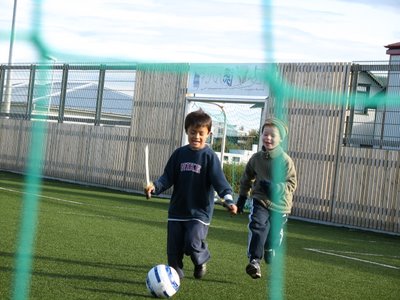

These three kids were playing at the football pitch in Borgarnes. I didn't wait to see if the third kid got up. I'm sure it was only a flesh wound.
Labels:
faces
A Day-Trip
I cannot drive. However, I can read a map. Lots of people who live on my floor, such as Branislav the Slovak and Keir the Californian, can drive, but have only a tenuous grip on where they are. So, we rented a car for six of us and took a day-trip. We decided to travel up towards the Snæfellsnes Peninsula, in order to look at the Snæfellsjökull icecap. This, I was convinced, because of a certain amount of geological ignorance, was a glacier inside a volcano. In fact, it is a glacier on top of a volcano. So sue me.
The first thing you notice when you leave Reykjavík is that people are very small and mountains are very large.

Little houses, all with red corrugated iron roofs and white plastered concrete walls, are settled down in the middle of fields, with giant volcanic outcrops above them.
They have built a tunnel under five kilometres of the sea, across the Hvalfjördur (Whale Fjord) in order to smooth off some of the crinkly edges which are so nice to look at but difficult to navigate. We decided not to take the tunnel, but to go round the side of the fjord. This was for two reasons. Whale Fjord is apparently full of cheerful whales joyously bouncing around in baline glee. We thought we might see some whales. The large whale-processing plant at the base of the fjord seems to have scared them away. Secondly, and much more reliable, is Glymur, Iceland's highest waterfall. You park your car at the bottom of a valley and walk up a hill. It is not very far, but it is quite confusing. The path leads through a cave

and across a river with no obvious bridge. And then up a hillside with no obvious path. Circumstantial evidence, I know, but maybe we were in the wrong place? But no: perseverence up the pathless scree slope leads you to the waterfall, which sometimes looks Japanese

and sometimes looks like the sort of phenomenon John Ruskin would write screeds about if his mind was on art and not the other thing.

Up, down. I didn't fall over on the downwards journey. Others did. Back to the car and onwards to Borgarnes. This is a small and extremely cold town where they keep greenhouses and gnomes, apparently with little saving irony.

We parked the car by the seaside and had a picnic of the kind I remember with fondness from my childhood.
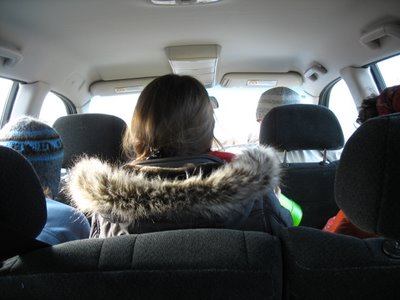
We drove on, with the increasingly weird landscape looking down on us all the time. Mountains

and lava fields

and things that were probably petrified trolls.
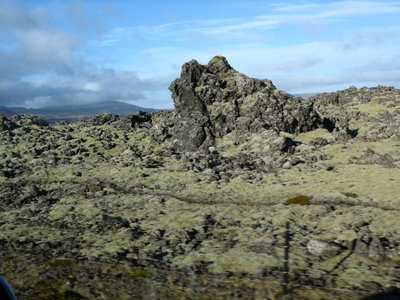
Then, finally, we got to Snæfellsjökull. We stopped at Sönghellir on the way. This is a cave which apparently was so full of echoes (bergmál, 'mountain talk') that people thought it was a haunt of dwarves. Presumably, dwarves who only spoke while they were being spoken to, in precisely the same words in which they were addressed. Oh well. I can confirm it is very echoey. I choose to illustrate it with a photo of what you can see from the cave, because caves themselves aren't all that photogenic.
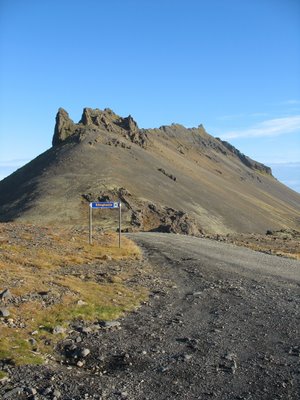
But upwards, upwards, always upwards. We drove up towards the top of the mountain, startling the merry snow buntings as we drove, in order to gaze across the majestic icecap that stands so proudly above the plains below...etcetera, etcetera. It was foggy. We saw nothing. We had to be content with the view back down into the valley.

We turned back, and thought we'd roll around the edge of the peninsula and then head home. So, we went to Hellnar, a fishing village which is apparently full of nesting birds in the summer. In October it has little to see apart from a fine breakwater built to protect the harbour. Every so often water splashes over the edge of the breakwater, and hits the unsuspecting people who stand on the breakwater looking out to see the sea. That is, us.

Then we went to the lighthouse at Malariff, which I thought was boring, and where I did not take photographs. Marian has recently finished reading To The Lighthouse: about halfway through, she turned to me and asked, 'Do they ever go to the bloody lighthouse?' Well, today we did, and I opted out. But while they were at the lighthouse, the clouds cleared over Snæfellsjökull.

On to Dritvík, which I think means Guano Bay. But it is in fact resolutely unshitty. A perfectly smooth and washed pebble beach, with occasional outbursts of harder rock that you can climb or just marvel at. The sun was setting, and there was a good view of the Tröllakirkja - a little outcrop that people thought at one time was the church for the trolls.

And the setting sun also made the Snæfellsjökull a lovely pink.

And as we got back to the car, a huge harvest moon, like a buoyant marble, was coming up from behind the mountain.
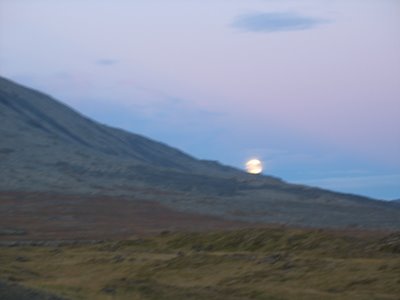
Oh, and we saw the Northern Lights on the way back. But maybe we can afford to be a bit blasé about them now.
The first thing you notice when you leave Reykjavík is that people are very small and mountains are very large.

Little houses, all with red corrugated iron roofs and white plastered concrete walls, are settled down in the middle of fields, with giant volcanic outcrops above them.
They have built a tunnel under five kilometres of the sea, across the Hvalfjördur (Whale Fjord) in order to smooth off some of the crinkly edges which are so nice to look at but difficult to navigate. We decided not to take the tunnel, but to go round the side of the fjord. This was for two reasons. Whale Fjord is apparently full of cheerful whales joyously bouncing around in baline glee. We thought we might see some whales. The large whale-processing plant at the base of the fjord seems to have scared them away. Secondly, and much more reliable, is Glymur, Iceland's highest waterfall. You park your car at the bottom of a valley and walk up a hill. It is not very far, but it is quite confusing. The path leads through a cave

and across a river with no obvious bridge. And then up a hillside with no obvious path. Circumstantial evidence, I know, but maybe we were in the wrong place? But no: perseverence up the pathless scree slope leads you to the waterfall, which sometimes looks Japanese

and sometimes looks like the sort of phenomenon John Ruskin would write screeds about if his mind was on art and not the other thing.

Up, down. I didn't fall over on the downwards journey. Others did. Back to the car and onwards to Borgarnes. This is a small and extremely cold town where they keep greenhouses and gnomes, apparently with little saving irony.

We parked the car by the seaside and had a picnic of the kind I remember with fondness from my childhood.

We drove on, with the increasingly weird landscape looking down on us all the time. Mountains

and lava fields

and things that were probably petrified trolls.

Then, finally, we got to Snæfellsjökull. We stopped at Sönghellir on the way. This is a cave which apparently was so full of echoes (bergmál, 'mountain talk') that people thought it was a haunt of dwarves. Presumably, dwarves who only spoke while they were being spoken to, in precisely the same words in which they were addressed. Oh well. I can confirm it is very echoey. I choose to illustrate it with a photo of what you can see from the cave, because caves themselves aren't all that photogenic.

But upwards, upwards, always upwards. We drove up towards the top of the mountain, startling the merry snow buntings as we drove, in order to gaze across the majestic icecap that stands so proudly above the plains below...etcetera, etcetera. It was foggy. We saw nothing. We had to be content with the view back down into the valley.

We turned back, and thought we'd roll around the edge of the peninsula and then head home. So, we went to Hellnar, a fishing village which is apparently full of nesting birds in the summer. In October it has little to see apart from a fine breakwater built to protect the harbour. Every so often water splashes over the edge of the breakwater, and hits the unsuspecting people who stand on the breakwater looking out to see the sea. That is, us.

Then we went to the lighthouse at Malariff, which I thought was boring, and where I did not take photographs. Marian has recently finished reading To The Lighthouse: about halfway through, she turned to me and asked, 'Do they ever go to the bloody lighthouse?' Well, today we did, and I opted out. But while they were at the lighthouse, the clouds cleared over Snæfellsjökull.

On to Dritvík, which I think means Guano Bay. But it is in fact resolutely unshitty. A perfectly smooth and washed pebble beach, with occasional outbursts of harder rock that you can climb or just marvel at. The sun was setting, and there was a good view of the Tröllakirkja - a little outcrop that people thought at one time was the church for the trolls.

And the setting sun also made the Snæfellsjökull a lovely pink.

And as we got back to the car, a huge harvest moon, like a buoyant marble, was coming up from behind the mountain.

Oh, and we saw the Northern Lights on the way back. But maybe we can afford to be a bit blasé about them now.
Labels:
adventures
Ducks at Dusk
The Tjörn (cognate with 'tarn') is a large ornamental - insofar as Iceland may be said to contain ornament - lake in the middle of Reykjavik, which exists mostly in order to provide the politicians in the Raðhús something to look at from their windows. It attracts a large number of ducks and geese of various sorts. At dusk they look quite picturesque.
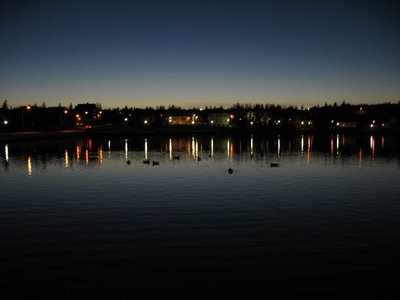
Also looking out onto the Tjörn is the Tjarnarbío, a cinema which has been the focal point of last week's Film Festival. I saw some good films, mostly with the word 'Road' in their titles (Red Road, The Road To Guantánamo). I saw some middling films, such as Keane (although the main actor was amazingly good), and a documentary about the wallpaper designer Florence Broadhurst, which was as interesting as you might think a film on such a subject would be.
In honour of the Reykjavík International Film Festival, here is a rough cut of my duck photo.
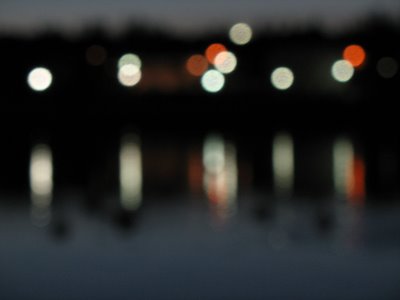

Also looking out onto the Tjörn is the Tjarnarbío, a cinema which has been the focal point of last week's Film Festival. I saw some good films, mostly with the word 'Road' in their titles (Red Road, The Road To Guantánamo). I saw some middling films, such as Keane (although the main actor was amazingly good), and a documentary about the wallpaper designer Florence Broadhurst, which was as interesting as you might think a film on such a subject would be.
In honour of the Reykjavík International Film Festival, here is a rough cut of my duck photo.

Saturday, October 07, 2006
Chased all over the Prado
'What a devilish lot of fuss about nothing!' cried one of the large young men. 'I agree with Charlie. Listen, brothers, or half-brothers, for such you probably are. You all knew my wicked Uncle Fred: if not, you cannot be called wise children. The ugliest brute that ever lived! Very well, a well-known Irish poet he met at a horse-race gave him a love philtre (this is what he told me). At that time he was the backwardest young man in the world, being such a hobgoblin. Very well, he tries a tiny drop of this in desperation. It works! All his life long he uses just a teeny drop - has to resign his commission, barred from the paddock, chased all over the Prado, three duels, the happiest man in the world, and lowered the standard of beauty for the whole human race, especially Stalbert. He got such faith in his philtre, he never said a by-your-leave. Very well, he had it analysed just before he passed out - pure water!'
'Excuse me,' cried Willoughby in some disorder, 'I must leave you for an hour so: I've just remembered an appointment of the greatest importance. See you later.' He rushed out, and across the square. The air was soft and blue, full of the leaping of his heart, like the soft sudden flashes of electricity. On such a night...! There was a light in Lady Stumber's window.
He went to his room first, looked in the glass: his whole face had the air of a false moustache. 'Am I drunk? Perhaps I am a little drunk,' said he with a titter. 'Wine! Passion!'
He went down the little curling stairs, slipping a step or two in the darkness. He tapped at the inner door.
'What? Who's that?' cried the voice of his beloved.
'Me, me,' replied Willoughby.
'Wait a moment,' she cried. 'Don't come in. What is it?'
'Life and death. Most important,' said he, flinging open the door. 'Constance!'
'Willoughy! What do you want? What's the matter with you?'
'Love,' said Willoughby, bursting into a laugh of pure joy. 'Love.'
'Are you drunk?' she asked, as if unable to believe her ears.
'On love!' said he, with a half-bow. 'Your hands, your arms, shoulders, neck, all!' With that he seized her, and aimed a series of kisses at each of the first four items as he named it.
'Do you want me to call for help?' said Lady Stumber firmly. 'I will call. I will.'
'Constance. Goddesses are for everyone.'
'Stop. I won't call, if only you'll be quiet for a moment. Listen. Please.' A table fell with a crash. He continued to imprint kisses at an incredible rate. Between them he panted, for Lady Stumber wriggled amazingly. 'You are tearing my clothes,' she cried.
'Yes, she has noticed it too!' thought Willoughby. 'We notice the same things! Besides, she is not calling. Love!'
John Collier, Defy The Foul Fiend (1934)
'Excuse me,' cried Willoughby in some disorder, 'I must leave you for an hour so: I've just remembered an appointment of the greatest importance. See you later.' He rushed out, and across the square. The air was soft and blue, full of the leaping of his heart, like the soft sudden flashes of electricity. On such a night...! There was a light in Lady Stumber's window.
He went to his room first, looked in the glass: his whole face had the air of a false moustache. 'Am I drunk? Perhaps I am a little drunk,' said he with a titter. 'Wine! Passion!'
He went down the little curling stairs, slipping a step or two in the darkness. He tapped at the inner door.
'What? Who's that?' cried the voice of his beloved.
'Me, me,' replied Willoughby.
'Wait a moment,' she cried. 'Don't come in. What is it?'
'Life and death. Most important,' said he, flinging open the door. 'Constance!'
'Willoughy! What do you want? What's the matter with you?'
'Love,' said Willoughby, bursting into a laugh of pure joy. 'Love.'
'Are you drunk?' she asked, as if unable to believe her ears.
'On love!' said he, with a half-bow. 'Your hands, your arms, shoulders, neck, all!' With that he seized her, and aimed a series of kisses at each of the first four items as he named it.
'Do you want me to call for help?' said Lady Stumber firmly. 'I will call. I will.'
'Constance. Goddesses are for everyone.'
'Stop. I won't call, if only you'll be quiet for a moment. Listen. Please.' A table fell with a crash. He continued to imprint kisses at an incredible rate. Between them he panted, for Lady Stumber wriggled amazingly. 'You are tearing my clothes,' she cried.
'Yes, she has noticed it too!' thought Willoughby. 'We notice the same things! Besides, she is not calling. Love!'
John Collier, Defy The Foul Fiend (1934)
Labels:
prose
Tuesday, October 03, 2006
But it does move...
'You must be the fiftieth woman who has said that to me. It's a credit to universal education that whenever a girl meets Dick Brown she begins to talk about the wheel and the lever. I've even had a French prostitute tell me about the fulcrum.'
This is from Mary McCarthy's novel The Group. I get the feeling that I might have found it a little more racy and / or true to life if I had managed to read it when it was first published, sixteen years before I was born. But please set me right - maybe Archimedes really is the subject of much current pillow-talk.
This is from Mary McCarthy's novel The Group. I get the feeling that I might have found it a little more racy and / or true to life if I had managed to read it when it was first published, sixteen years before I was born. But please set me right - maybe Archimedes really is the subject of much current pillow-talk.
Labels:
prose
Dialogues
What goes through the minds of the people who write language-teaching books? Here is a dialogue from my textbook. It is between, I assume, Oscar Wilde and a particularly patient shop assistant.
Assistant: 'Who's next?'
Customer: 'I am next.'
Wilde: 'No, I was before you.'
Customer: 'Pardon me.'
Assistant: 'What can I get you?'
Wilde: 'I would like ten beautiful roses.'
Assistant: 'Would you like yellow roses or pink ones?'
Wilde: 'I would like neither... perhaps you have some red ones?'
Assistant: 'Alas, no.'
Wilde: 'All right, I'll take five yellow and five pink. How much does one rose cost?'
Assistant: 'One hundred and seventy-five crowns.'
Wilde: 'Aie, I have no money. May I pay you tomorrow?'
The indigent aesthete, famously the best teaching-aid. Or else we are expected to believe that the characters are educationally subnormal:
Troll 1 [trying to trick his friend]: 'What day is today?'
Troll 2 [firmly]: 'Today is Tuesday.'
Troll 1 [wheedling]: 'Isn't today Wednesday?'
Troll 2 [counting on his knuckles]: 'Hmm, you're right.'
Troll 1 [triumphant]: 'Yes, yesterday was Tuesday.'
Troll 2 [desperate to win back some troll-cred]: 'And it's Thursday tomorrow.'
But now I know the days of the week. Saturday - Laugardagur - must have some connection with 'lauga', 'to wash'.
Assistant: 'Who's next?'
Customer: 'I am next.'
Wilde: 'No, I was before you.'
Customer: 'Pardon me.'
Assistant: 'What can I get you?'
Wilde: 'I would like ten beautiful roses.'
Assistant: 'Would you like yellow roses or pink ones?'
Wilde: 'I would like neither... perhaps you have some red ones?'
Assistant: 'Alas, no.'
Wilde: 'All right, I'll take five yellow and five pink. How much does one rose cost?'
Assistant: 'One hundred and seventy-five crowns.'
Wilde: 'Aie, I have no money. May I pay you tomorrow?'
The indigent aesthete, famously the best teaching-aid. Or else we are expected to believe that the characters are educationally subnormal:
Troll 1 [trying to trick his friend]: 'What day is today?'
Troll 2 [firmly]: 'Today is Tuesday.'
Troll 1 [wheedling]: 'Isn't today Wednesday?'
Troll 2 [counting on his knuckles]: 'Hmm, you're right.'
Troll 1 [triumphant]: 'Yes, yesterday was Tuesday.'
Troll 2 [desperate to win back some troll-cred]: 'And it's Thursday tomorrow.'
But now I know the days of the week. Saturday - Laugardagur - must have some connection with 'lauga', 'to wash'.
Labels:
sentences
Why Aren't we Remembering the Centenary of His Death?

James McIntyre (1827-1906)
'Ode on the Mammoth Cheese Weighing Over 7000 Pounds'
We have seen you, Queen of Cheese,
Laying quietly at your ease,
Gently fanned by evening breeze -
Thy fair form no flies dare seize.
All gaily dressed soon you'll go
To the great Provincial Show,
To be admired by many a beau
In the city of Toronto.
Cows numerous as a swarm of bees -
Or as the leaves upon the trees -
It did require to make thee please,
And stand unrivalled Queen of Cheese.
May you not receive a scar as
We have heard that Mr. Harris
Intends to send you off as far as
The great World's Show at Paris.
Of the youth - beware of these -
For some of them might rudely squeeze
And bite your cheek; then songs or glees
We could not sing, O Queen of Cheese.
Wert thou suspended from balloon,
You'd cast a shade, even at noon;
Folks would think it was the moon
About to fall and crush them soon.
The picture has nothing directly to do with the poem: it is surprisingly difficult to find images on the internet of gigantic cheeses. Although a search for images of "huge cheeses" gives you, on its first page of results, a link to my brother's webpage. Is this embarrassing, or is it just the sort of happy coincidence we should cling to?
Labels:
poetry
Sunday, October 01, 2006
Aurora Borealis
So, it's Lauren's birthday. She lives on my floor and is from Tennessee. In fact, she is from Chattanooga, Tennessee, a place I have hitherto only known of because of its choochoo. But, it's her birthday today - she is twenty-one. We made some party food, mostly involving various combinations of garlic and cheese. My present to her was to teach her how to make Dark And Stormies: the important thing is not to stint on the amount of lime you add, especially as most ginger beer is far too sweet. So - did I say this before? - it's Lauren's birthday, and we're drinking the aforementioned Dark and Stormies. Someone looks out of the window and says, "Hey, the Northern Lights!". And we look out of the window and what do you know, there they are. They are primarily green today, except they fade into blue every now and again. They ripple and move and grow brighter and darker. Everyone from my floor walks down to the beach in order to be able to see them without so much light pollution. It is one of those things that you look at and say, "Ah!" - like fireworks or new-born children.
This is a post which would work much better with some of my photographs in it, but all the attempts I made to photograph the Northern Lights were hopeless. This is a page with some pictures which look very little like what I actually saw, but it'll have to do until my brother comes out to visit me, bringing his high-quality space-age camera with him.
This is a post which would work much better with some of my photographs in it, but all the attempts I made to photograph the Northern Lights were hopeless. This is a page with some pictures which look very little like what I actually saw, but it'll have to do until my brother comes out to visit me, bringing his high-quality space-age camera with him.
Labels:
lights
Subscribe to:
Comments (Atom)
